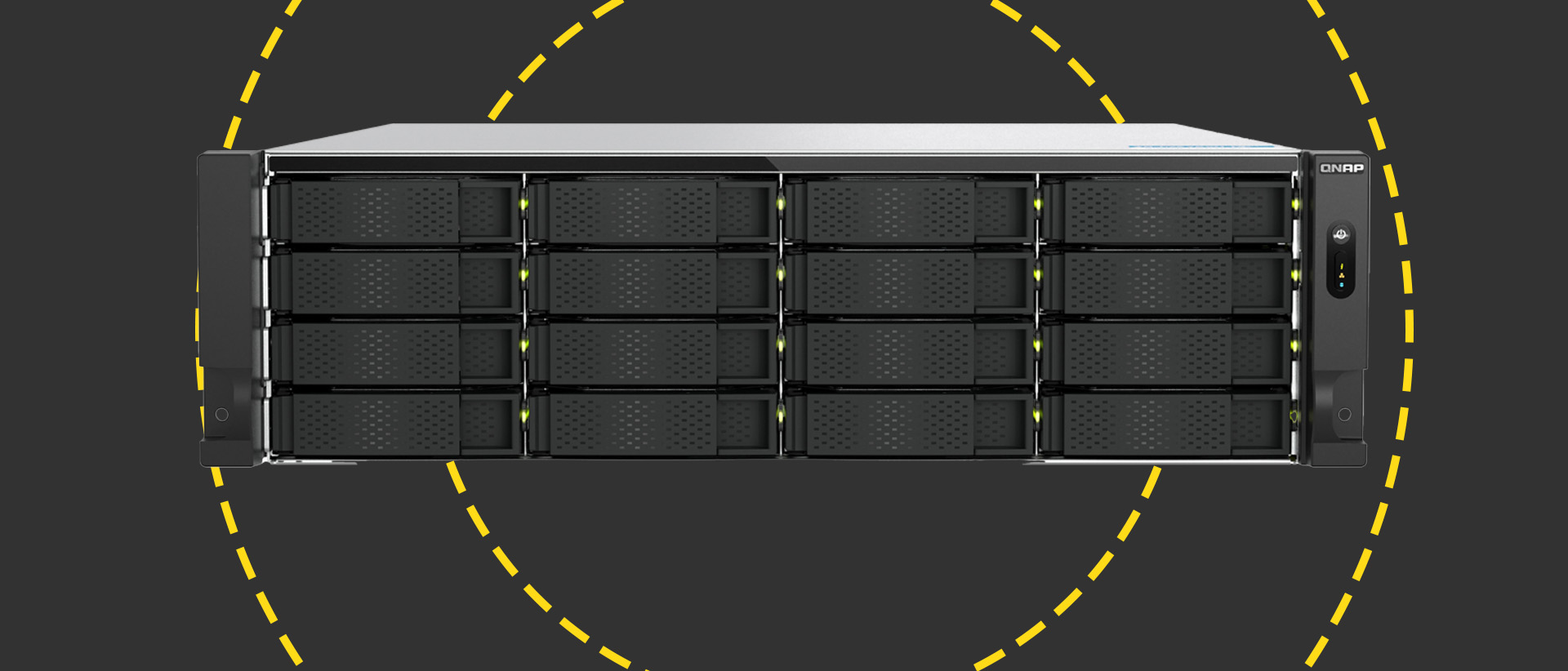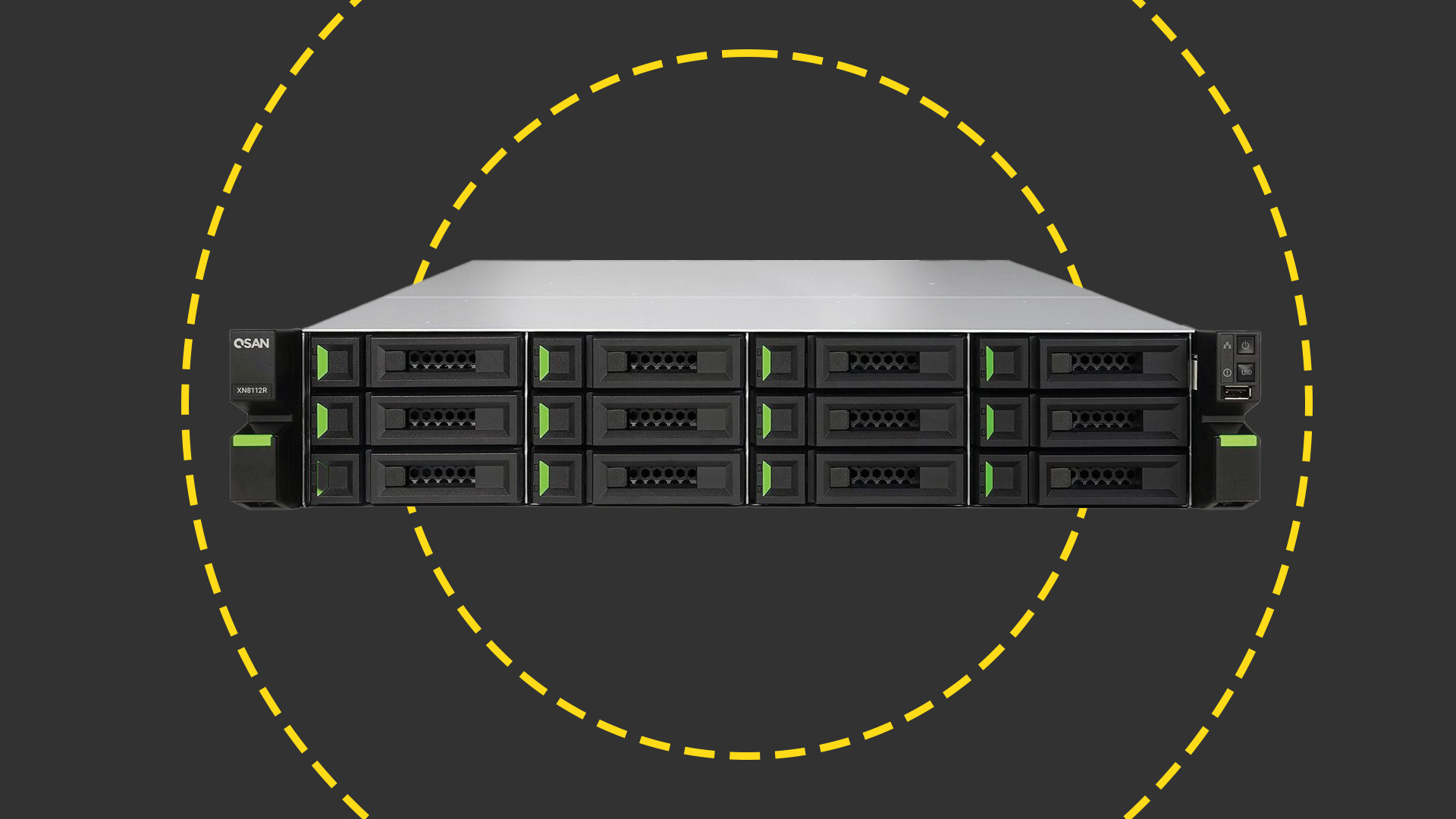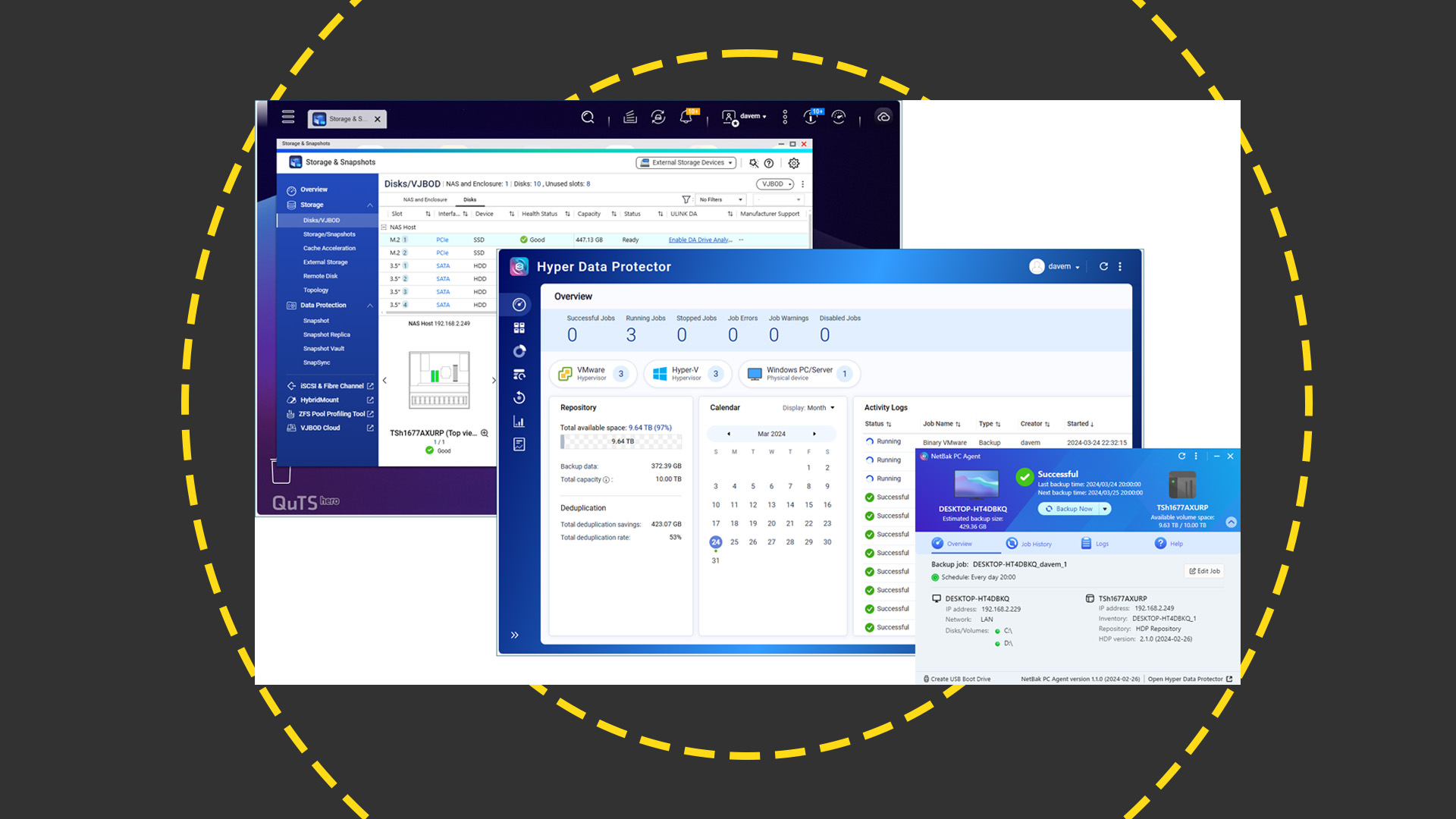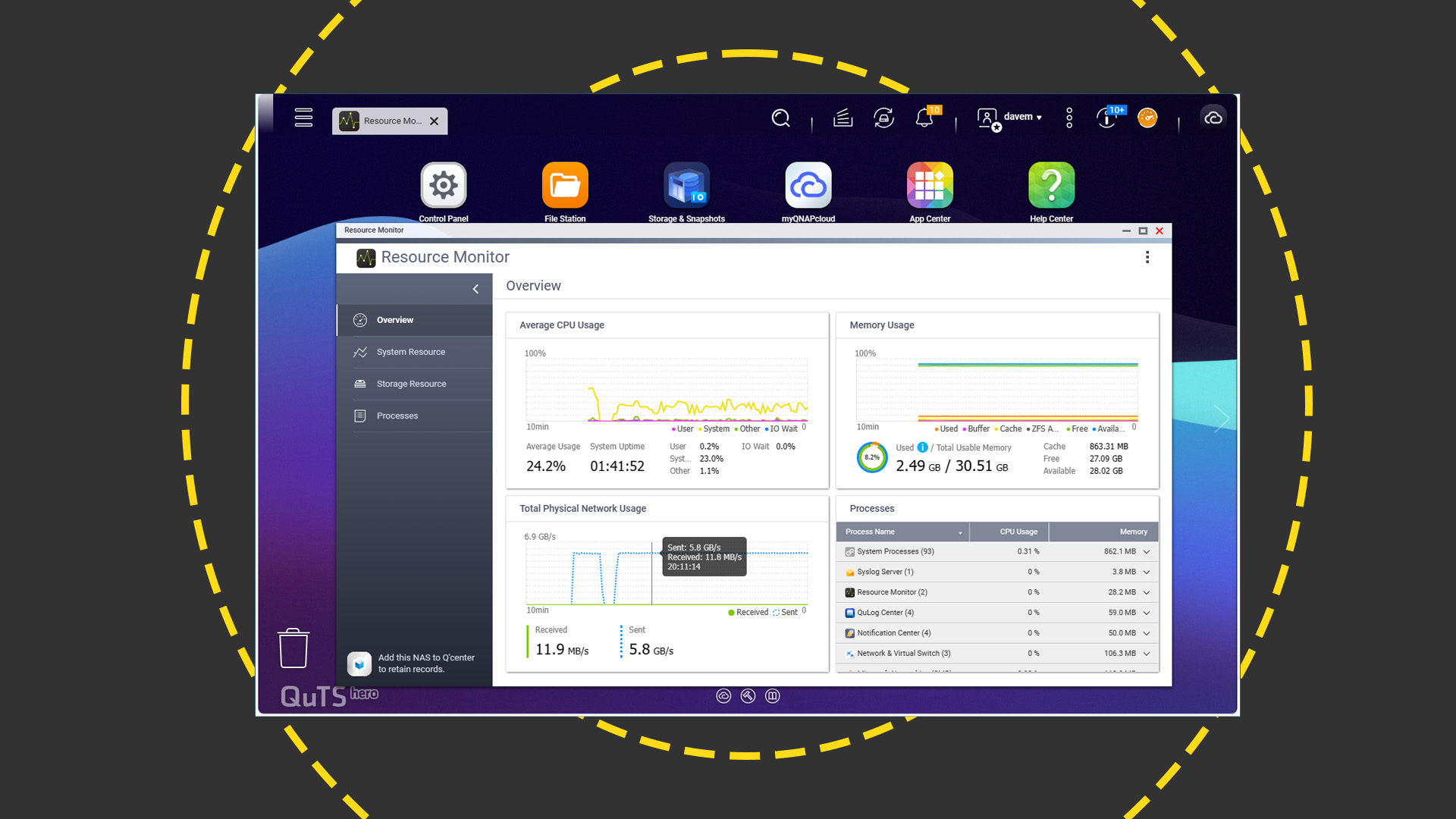Qnap TS-h1677AXU-RP review: Fast Ryzen-powered storage for SMBs
A versatile and powerful rack NAS with excellent 25GbE performance and plenty of data protection features

-
+
High storage potential
-
+
AMD Ryzen 7 CPU, DDR5 memory
-
+
Great 25GbE performance
-
+
Good expansion options
-
+
QuTS hero data protection
-
-
Nothing of note

READ MORE

Qnap moves deeper into enterprise territory with the launch of two rack appliances that aim to offer a tempting combination of storage features, performance, and capacity. There's certainly plenty of power on tap with the top-dog TS-h1677AXU-RP on review sporting an 8-core 3.8GHz AMD Ryzen 7 7700 CPU teamed up with speedy DDR5 memory.
The appliance presents sixteen hot-swap LFF/SFF drive bays at the front and inside you'll find a pair of M.2 2280 PCIe Gen5 slots for NVMe SSDs. Capacity expansion is excellent as Qnap offers a wide range of JBOD enclosures – the TS-h1677AXU-RP supports up to eight 24-bay 4U TL-R2400PES-RP shelves for a total of 208 drives and over 4PB of storage.
Networking looks good as the appliance presents dual embedded 2.5GbE and 10GbE RJ45 ports which are all the multi-Gigabit variety. There's room for more as you have three spare PCIe Gen4 expansion slots and Qnap offers a good choice of 2.5, 10, 25, and 100GbE cards.
Qnap TS-h1677AXU-RP review: Software choices
The 'h' in the model name clearly shows which operating system (OS) Qnap is aiming this appliance at, but you do have the option of loading QTS as well. Before jumping in though, bear in mind there are a lot of differences between them and you can only swap from one to the other after backing up your data and reinitializing the appliance.

QTS is best for SMBs that want simplified data protection features as it supports manual and scheduled snapshots on EXT4 volumes. Its snapshot service only requires a minimum of 1GB of memory, the maximum 4TB SSD cache size needs 16GB of system memory and QTS supports the Qtier 2 data migration feature.
The ZFS-based QuTS hero will be the preferred choice for most enterprises as it offers far more data integrity and storage reduction features. End-to-end checksums provide transparent data corruption recovery, it supports triple parity RAID and triple mirroring, big storage savings can be made with in-line data deduplication plus compression, and WORM (write once read many) policies can be applied to NAS shares to protect their data from tampering or accidental deletion.
There's good reason why the appliance comes with a base 32GB of memory as QuTS is more demanding in this department. It needs at least 16GB for its inline data deduplication feature, 32GB to get the best performance from 10GbE connections, and this much as well for SSD cache sizes up to 1TB.
Qnap TS-h1677AXU-RP review: 25GbE performance
We opted to test over 25GbE and installed a Qnap QXG-25G2SF-CX4 dual-port 25GbE adapter in the appliance and fitted another in the lab's Dell PowerEdge R650xs Xeon Scalable rack server running Windows Server 2022. During installation, we chose QuTS hero from the web-based wizard and used dual mirrored NVMe SSDs as a system pool and four 22TB Western Digital Red Pro HDDs in a RAID5 array for data storage.

NAS performance is excellent with a mapped share returning Iometer sequential read and write rates of 23.1Gbits/sec and 23Gbits. Swapping over to random operations saw equally impressive read and write speeds of 23.1Gbits/sec and 22.5Gbits/sec.
IP SAN performance was very similar with a 1TB iSCSI target delivering 23.1Gbits/sec and 23Gbits/sec sequential read and write rates and 23.1Gbits/sec and 22.5Gbits/sec for random operations. Upping the pressure with a dual 25GbE MPIO link, Iometer reported sequential and random read and write speeds of 46.2Gbits/sec and 42.1Gbits/sec and 46.2Gbits/sec and 37.5Gbits/sec respectively.
The results from our NAS and IP SAN Iometer random tests clearly show how efficient the QuTS hero ZFS ARC (adaptive read cache) and ZIL (ZFS intent log) are. Essentially, you don't need to waste any storage bays on SSD caches as you're unlikely to see any significant improvements over these numbers.
Qnap TS-h1677AXU-RP review: Data protection features
There are no compromises on data integrity as QuTS hero offers ZFS copy-on-write for fast, almost unlimited snapshots of NAS shares and iSCSI LUNs which can be scheduled to run as often as every minute for near-continuous protection. Both NAS shares and iSCSI LUNs can now be encrypted and the SnapSync app provides fast, bandwidth-light replication to remote appliances using scheduled and real-time block-level snapshots.
WORM offers valuable ransomware protection and once enabled during NAS folder creation, it cannot be modified or disabled. The Enterprise policy allows a protected folder to be deleted but stops anything in it from being individually modified or removed while the stronger Compliance policy blocks folder deletion and only allows it to be removed by deleting the entire storage pool.
RELATED WHITEPAPER

Backup apps are in abundance with Hybrid Backup Sync (HBS) 3 managing 3-2-1 protection strategies and securing local appliance data to cloud providers or remote NAS appliances for off-site storage. The Hyper Data Protector (HDP) app supports VMware and Hyper-V virtualized environments, presents a dedicated web console for VM backup and restore tasks, and can now remotely protect PCs and servers with Qnap's free NetBak agent loaded on them.
More security features are available as along with the Antivirus, Malware Remover, and QuFirewall apps, Qnap's Security Counselor uses predefined scan policies to search for and draw your attention to vulnerabilities. The appliance has enough power to host virtual machines and the Container Station, Ubuntu Linux Station, and Virtualization Station apps are all available for QuTS hero.
Qnap TS-h1677AXU-RP review: Is it worth it?
The TS-h1677AXU-RP is comparatively good value as its starting price of around £4,314 delivers a powerful NAS package driven by a fast AMD Ryzen 7 7700 CPU and DDR5 memory. To put this in perspective, Synology's 16-bay RS4021xs+ costs a shade over £4,000 and this only gets you an elderly Xeon D-1541 CPU and 16GB of DDR4 memory.
Along with an impressive storage potential, the TS-h1677AXU-RP has no restrictions on HDDs and SSDs as Qnap's compatibility list has all the main manufacturers on it. The appliance delivered great results in our 25GbE NAS and IP SAN performance tests and Qnap's QuTS hero OS provides an excellent range of data integrity and protection features.
Qnap TS-h1677AXU-RP specifications
| Chassis | 3U rack chassis |
| CPU | 3.8GHz 8-core AMD Ryzen 7 7700 |
| Memory | 32GB DDR5 UDIMM (max 128GB) |
| Storage | 16 x SATA LFF/SFF, 2 x M.2 2280 PCIe Gen5 slots |
| RAID | RAID0, 1, 5, 6, 10, 50, 60, Triple Mirror, Triple Parity |
| Expansion | 3 x PCIe Gen 4 |
| Network | 2 x 2.5GbE, 2 x 10GbE RJ45 (all multi-Gigabit) |
| Other ports | 2 x Type-A USB 3.2 Gen 2 |
| Power | 2 x hot-plug 550W PSUs |
| Management | Web browser |
| Warranty | 5 years limited |
Get the ITPro daily newsletter
Sign up today and you will receive a free copy of our Future Focus 2025 report - the leading guidance on AI, cybersecurity and other IT challenges as per 700+ senior executives
Dave is an IT consultant and freelance journalist specialising in hands-on reviews of computer networking products covering all market sectors from small businesses to enterprises. Founder of Binary Testing Ltd – the UK’s premier independent network testing laboratory - Dave has over 45 years of experience in the IT industry.
Dave has produced many thousands of in-depth business networking product reviews from his lab which have been reproduced globally. Writing for ITPro and its sister title, PC Pro, he covers all areas of business IT infrastructure, including servers, storage, network security, data protection, cloud, infrastructure and services.
-
 ‘Phishing kits are a force multiplier': Cheap cyber crime kits can be bought on the dark web for less than $25 – and experts warn it’s lowering the barrier of entry for amateur hackers
‘Phishing kits are a force multiplier': Cheap cyber crime kits can be bought on the dark web for less than $25 – and experts warn it’s lowering the barrier of entry for amateur hackersNews Research from NordVPN shows phishing kits are now widely available on the dark web and via messaging apps like Telegram, and are often selling for less than $25.
By Emma Woollacott Published
-
 Redis unveils new tools for developers working on AI applications
Redis unveils new tools for developers working on AI applicationsNews Redis has announced new tools aimed at making it easier for AI developers to build applications and optimize large language model (LLM) outputs.
By Ross Kelly Published
-
 Google layoffs continue with "hundreds" cut from Chrome, Android, and Pixel teams
Google layoffs continue with "hundreds" cut from Chrome, Android, and Pixel teamsNews The tech giant's efficiency drive enters a third year with devices teams the latest target
By Bobby Hellard Published